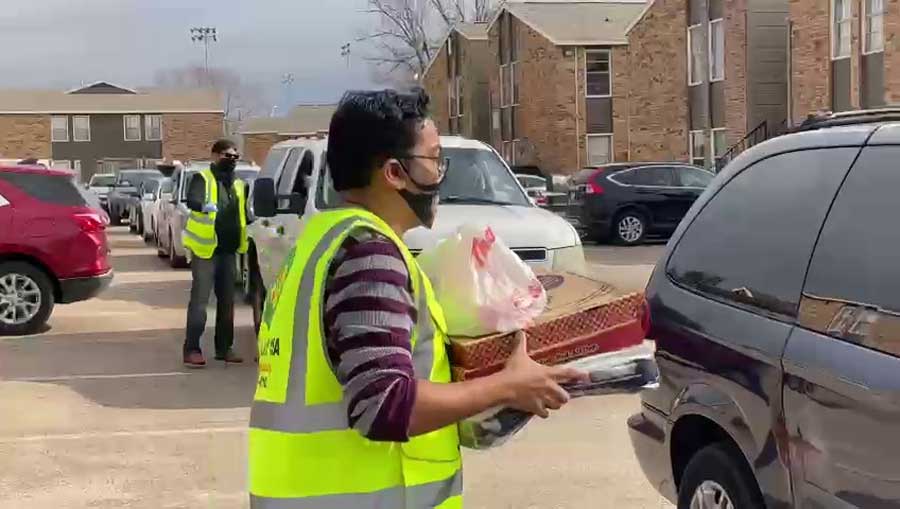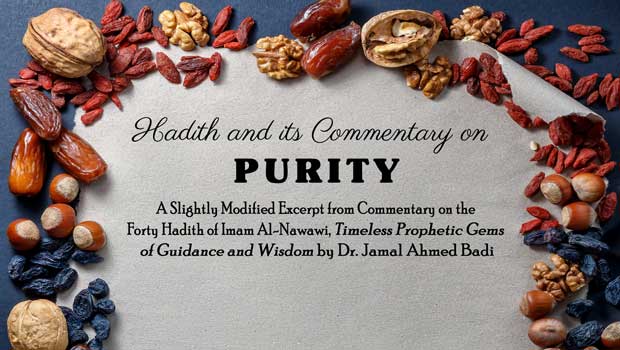One of the greatest and most rewarding acts of worship is the giving of charity for the sake of Allah SWT, but oftentimes people limit their donations to the month of Ramadan rather than year-round. This is when many pay zakat, which is one of the pillars of Islam. Zakat is obligatory and is considered a “cleansing” of one’s wealth. It is 2.5 percent of surplus wealth that has been in one’s possession for a lunar year. Another aspect of charity is sadaqah which is voluntary. It can be the donating of money for the sake of Allah SWT, but it beautifully encompasses so much more. It can be any act of goodness done for the sake of Allah like supporting in any way one can the orphans, widows, and the needy. But it also includes kindness, compassion, and even a good word, or greeting another with a smile. So, we can keep in mind that charity in Islam has wide meaning and is often referred to as “spending in the cause of Allah.”
In Surat al-Hadeed, a number of the amazing blessings of charity can be understood, such as the following: “Believe in Allah and His Messenger and spend [on others] from that which He has made you trustees. So those of you who believe and spend [in Allah’s cause] will have a mighty reward” (57:7).
Reflection 1: You are a trustee of any wealth you possess in this life.
The verse says “…spend [on others] from that which He has made you trustees” (57:7). This makes clear that any wealth you have in this world is a test from Allah SWT, that you are considered a trustee of that wealth. Whatever has been acquired by you, from any source, you are commanded to use it for the sake of Allah SWT, and you will be held accountable about the means by which you received it and how you spent it. If you fail as a trustee by disobeying Allah and hoarding your wealth or by spending it in any way that contributes to that which is false, wrong, or unjust, you will be held accountable for it.
It is not permissible for the caretaker and trustee of Allah’s wealth to hold back stingily or to spend in a prohibited manner. Imam Ahmad recorded that `Abdullah bin Ash-Shikhir said, “I came to Allah’s Messenger as he was reciting, ‘the worldly pursuit of abundance distracts you’ [Qur’an 102:1]. Then he (s) said, ‘The son of Adam says, “My wealth, my wealth.” But is there anything belonging to you, except that which you consumed, which you used, or which you wore and then it became worn, or you gave as charity and sent it [forward to the afterlife]?’” Imam Muslim also collected the hadith with the addition: “Everything other than that, you will part from it and leave it behind for other people.”
Reflection 2: Your caretaker role is temporary.
Another crucial reflection from this verse is that the wealth you have now is completely temporary. Wealth is constantly moving about, transferring from person to person, and yesterday’s trustee was replaced with today’s caretaker, and today’s caretaker will be replaced by another trustee of that wealth tomorrow.
Your wealth today will transfer onwards and away from you upon death, and when that time of departure arrives, know that you will be questioned about what you did during the limited time the wealth was entrusted to you. If you spend it for the sake of Allah SWT with sincerity, with intention to undertake good deeds, Allah will bless you with an eternal – permanent – return on your act of spending for His sake. The one who disobeyed Allah and refused to spend in acts of charity, lost out on that opportunity.
One should keep in mind that investing one’s wealth is not prohibited but instead encouraged in Islam, in order to benefit more people and to keep a healthy economy running, so long as the investment is done in a manner pleasing to Allah. Hoarding wealth, however, is dangerous spiritually for the individual and, further, is unhealthy for society.
In many situations today, the head of the household will usually have an emergency fund or a savings fund, without interest, for the sake of serving their families in times of great need such as loss of one’s job or source of income, sickness or injury, etc. This is permissible so long as it is not extravagant to the extent that it is hoarding an excessive amount of wealth.
Reflection 3: The reward for belief and charity is mighty.
“So those of you who believe and spend [in Allah’s cause] will have a mighty reward” (57:7). Acquiring and spending any amount of wealth in this life, whether it is through monetary donation, spending for the common good, or spending time and energy in public service or to help the needy, if it is for the sake of Allah SWT, it is linked to a great reward in the afterlife (i.e., Allah’s pleasure and the reward of paradise). Allah SWT informs us that He has purchased from the believers their lives and their wealth, in exchange for paradise (Qur’an 9:111). Therefore, one who disobeys Allah and rejects His command, and pridefully thinks that they’ll be saved by their wealth, fame, power, or accomplishments in life (which are blessings from Allah), is foolish and in loss unless they repent and return to their Creator sincerely. You can purchase paradise, by believing in Allah SWT, doing righteous deeds, and giving charity.
Abu Hurayrah (r) narrates that, “The Messenger of Allah (s) said, ‘Whoever gives charity equal to a date from good [halal] earnings – for Allah does not accept anything but that which is good – Allah will take it in His right hand and tend it for the one who gave it as any one of you tends his foal, until it becomes like a mountain” (Bukhari).
Reflection 4: Allah is the King, the Provider, and the Inheritor of the universe.
There’s a significant reminder in Surat Al-Hadeed to spend in the cause of Allah and simultaneously remember that Allah is the King and Owner of the universe. Allah is the provider, so give without fear of loss, poverty, or scarcity. Allah is Al-Waarith. The name of Allah as Al-Waarith is found in different forms. In the Qur’an, there are several notable references, such as: “Surely it is We Who give life and cause death. And We are the [eternal] Successor (Waarithoon)” (15:23).
As one scholar said, “Al-Waarith is the One who remains when all of the creation perishes, and He retakes all of their possessions when they die, and only Allah SWT will remain” (Al-Khattabi).
Interestingly, Al-Waarith is not combined with any other Name or Attribute of Allah SWT in the Qur’an, it is always mentioned as a standalone, and we reflect on how Al-Waarith alone remains when all of the creation perishes. Everything belongs to Allah, and everything will perish in this universe, and yet Allah will always remain.
Reflection 5: Whatever you give in charity, Allah will replace.
Spending for the sake of Allah SWT is in proportion to how much you believe that everything belongs to Allah, and that provision comes from Him, and that what you give – He replaces. “And whatever you spend [in His cause], He will compensate it. For He is the Best Provider” (Qur’an 34:39). It was narrated from Abu Hurayrah (r) that the Messenger of Allah (s) said: “Allah said: ‘Spend, O son of Adam, and I shall spend on you’” (Bukhari).
Reflection 6: Charity in times of difficulty or hardship is more rewarding.
In Surat al-Hadeed, Allah SWT mentions that the companions who spend of their wealth and possessions before the liberation of Makkah would have a greater reward than those who did so afterwards, although all will be rewarded for their good deeds (57:10). There’s a massive reward when someone donates in a time of great need. For example, think of the global Covid-19 pandemic when it began in early 2020 in many countries and how many people and organizations struggled, and shortly afterwards how many amazing individuals and institutions stepped forward to aid and assist as many people as possible during a time of great difficulty. Fear causes people to limit their charities and services, and therefore those who step forward during such times are given a greater reward.
Reflection 7: Allah SWT is aware of your situation and your every charity, no matter how small.
The verse concludes with yet another emphasis on the knowledge of Allah SWT. Allah is All-Aware of your actions. Since Allah is aware of everything, He also will reward and compensate people in different ways, therefore every good deed performed is beneficial and no good deed should be belittled, as the Messenger (s) taught us. People are rewarded based on their sincerity and circumstances, which are known to Allah, as in the example of the man who donated one dirham, whose charity surpassed that of the man who gave 100,000 dirhams. Because Allah is All-Knowing, He knows that the man who gave one dirham in charity only had two dirhams total, and thus spent half of his wealth in charity, and Allah is aware of the man’s intention (e.g., perhaps the man would have spent half as well if he had a million dirhams and would wish to give more). The man who gave 100,000 dirhams perhaps had much more than that, and it was easier for him to donate, and Allah is aware of their situations with perfect knowledge.
Therefore, this verse serves as a powerful motivation for all believers to do their best with their respective circumstances. If you cannot pray as many voluntary prayers anymore because there has been a change in your life circumstances that prevents that, but you used to pray qiyaam consistently, know that Allah is aware of your situation and intentions, and that if your circumstances were slightly different – such as not working 2-3 jobs out of necessity, or raising multiple young children – that you would pray more voluntary prayers. As mentioned above, the man who donated one dirham might earn a greater reward with Allah than the man who donated 100,000, and the woman who prayed just two units of qiyaam prayer at night might earn a greater reward than the woman who prayed one-hundred units of prayer, and Allah knows best.
A man mentioned to his friends how he used to ask in du’a (supplication) for great wealth and told himself that he would then give in charity. He one day realized that he was lying to himself because he already had a six-figure salary and was living more than comfortably. He realized that if he wasn’t giving in the present, he probably would find excuse not to give in charity when he earned more. He made an intention to begin immediately to give in charity and to do good with his wealth from then on. He soon after noticed an increased barakah in his life and, especially, a sense of peace and contentment. This is a good lesson to us that giving does not depend on, and should not be delayed until, having great wealth. The Messenger (s) said, “Protect yourself from hellfire even by giving a piece of a date as charity” (Bukhari).
Reflection 8: The ‘good loan’ (i.e., charity) will be multiplied many times over.
“Who is it that will lend to Allah a good loan which Allah will multiply for him, and he will have an honorable reward?” (57:11). This ayah refers to all believers with good intentions who spend for the sake of Allah SWT in any of countless ways. In this verse, “…will multiply for him” means manifold times — 70, 700, or millions of times — for the deed. Reflect on how generous Allah SWT is and how amazing an opportunity this presents. One good deed could result in 700 times the return! One good deed could result in millions of rewards. What better transaction could exist, better than this one with Al-Razzaq, the Provider of sustenance, and Al-Kareem, the Generous and the Beneficent?
Why is charity here referred to as a qard hasan (a good loan)? Ibn al-Qayyim mentions that charity here is referred to as a good loan to motivate the desires of people (who want a repayment), and to make it easier for those who struggle to give, thinking that they are losing when giving charity. It has been likened to a loan because the promise of Allah is that a sincere charity will be replaced and compensated. The qard hasan requires that the one giving charity be sincere and truthful in his intention; that he is seeking Allah’s pleasure without any showing off or caring about human praise, or puffing up of his reputation or ego; that he is giving in charity from the best of what he has, and for the wealth to be pure/halal in how it was attained.
May Allah SWT accept our charities, public and private, and make them sincere and impactful.






